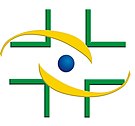Brazilian Health Regulatory Agency
| Agência Nacional de Vigilância Sanitária | |
 | |
| Agency overview | |
|---|---|
| Formed | 26 January 1999 |
| Jurisdiction | Federative Republic of Brazil |
| Headquarters | Brasília, Brazil |
| Employees | 2206[1] |
| Annual budget | R$ 3.261.331.118.216,00 (2019) [2] |
| Agency executive |
|
| Website | https://www.gov.br/anvisa/ |
Brazilian Health Regulatory Agency (Portuguese: Agência Nacional de Vigilância Sanitária, Anvisa) is a regulatory body of the Brazilian government, created in 1999 during President Fernando Henrique Cardoso's term of office. It is responsible for the regulation and approval of pharmaceutical drugs, sanitary standards and regulation of the food industry.
The agency bills itself as "an independently administered, financially autonomous" regulatory body. It is administered by a five-member collegiate board of directors,[4] who oversee five thematic directorates, assisted by a five-tier oversight structure.[5] Since September 2018 the agency is headed by Antonio Barra Torres.[3]
Pesticide approvals[]
Brazil is the world's largest consumer of pesticides.[6][7] They are primarily used in the production of soy and corn.[6] The number of approved pesticides increased "rapidly" between 2015 and 2019.[7] Tereza Cristina, the agriculture minister, noted that "there is no general liberation" of new pesticide registrations and no reason for concern when pesticides are used as instructed.[7]
See also[]
- Regulation of therapeutic goods
- Epidemic Intelligence Service
- World Health Organization (WHO;
 United Nations)
United Nations)
References[]
- ^ "Detalhamento dos Servidores Públicos por Órgão - Portal da transparência". www.portaldatransparencia.gov.br. Retrieved Jan 4, 2021.
- ^ "Orçamento da despesa - Portal da transparência". www.portaldatransparencia.gov.br. Retrieved Jan 4, 2021.
- ^ Jump up to: a b "Senado aprova indicação de Antonio Barra Torres para diretor da Anvisa". Idec (in Portuguese). July 15, 2019. Retrieved March 12, 2021.
- ^ "Sanitary Surveillance's official website in English". Archived from the original on 2013-02-16.
- ^ "ORGANOGRAMA". ANVISA. Retrieved 6 October 2017.
- ^ Jump up to: a b Jenny Gonzales (February 20, 2018). "Brazil's fundamental pesticide law under attack". Mongabay. Retrieved July 30, 2019.
- ^ Jump up to: a b c Sue Bradford, Thais Borges (May 3, 2019). "Brazil's Bolsonaro Green-Lights 150+ Pesticides This Year". EcoWatch. Retrieved July 30, 2019.
- Government agencies of Brazil
- National agencies for drug regulation
- Medical and health organisations based in Brazil
- Regulators of biotechnology products
- Life sciences industry
- Regulation in Brazil
- National public health agencies
- Government agencies established in 1999
- 1999 establishments in Brazil
- Brazil government stubs